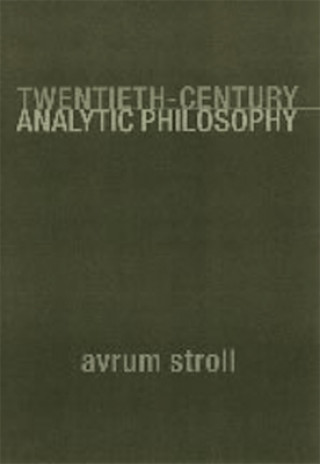
Kod: 04557417
Twentieth-Century Analytic Philosophy
Autor Avrum Stroll
Analytic philosophy is difficult to define since it is not so much a specific doctrine as a loose concatenation of approaches to problems. As well as having strong ties to scientism -the notion that only the methods of the natural ... więcej
- Język:
 Angielski
Angielski - Oprawa: Miękka
- Liczba stron: 304
Wydawca: Columbia University Press, 2001
- Więcej informacji o książce

Zobacz książki o podobnej tematyce
-

Dune
50.67 zł -3 % -

Haunting Adeline
126.33 zł -1 % -

Berserk Deluxe Volume 2
214.14 zł -1 % -

White Nights
11.02 zł -28 % -

Powerless
47.23 zł -14 % -

Atomic Habits
55.52 zł -31 % -

Dune Messiah
46.52 zł -3 % -

Berserk Deluxe Volume 3
219.29 zł -3 % -

One Day
34.48 zł -44 % -

Berserk Deluxe Volume 1
212.72 zł -2 % -

Iron Flame
61.39 zł -28 % -

Surrounded by Idiots
36.91 zł -28 % -

Harry Potter and the Prisoner of Azkaban (Minalima Edition)
171.14 zł -2 % -

Gravity Falls Journal 3
89.61 zł -

Heaven Official's Blessing: Tian Guan Ci Fu (Novel) Vol. 1
87.59 zł -3 % -

The Creative Act
103.37 zł -12 % -

Dune
48.44 zł -21 % -

Hunting Adeline
126.84 zł -4 % -

A Little Life
47.23 zł -14 % -

Children of Dune
46.93 zł -2 % -

Heaven Official's Blessing: Tian Guan Ci Fu (Novel) Vol. 2
78.08 zł -14 %
Bon podarunkowy: Radość gwarantowana
- Podaruj bon o dowolnej wartości, a my się zajmiemy resztą.
- Bon podarunkowy dotyczy całej naszej oferty.
- Możesz wydrukować elektroniczny bon z e-maila a następnie przekazać go obdarowanemu.
- Ważność bonu wynosi 12 miesięcy od daty wystawienia.
Więcej informacji o Twentieth-Century Analytic Philosophy
Za ten zakup dostaniesz 113 punkty
 Opis
Opis
Analytic philosophy is difficult to define since it is not so much a specific doctrine as a loose concatenation of approaches to problems. As well as having strong ties to scientism -the notion that only the methods of the natural sciences give rise to knowledge -it also has humanistic ties to the great thinkers and philosophical problems of the past. Moreover, no single feature characterizes the activities of analytic philosophers. Undaunted by these difficulties, Avrum Stroll investigates the "family resemblances" between that impressive breed of thinkers known as analytic philosophers. In so doing, he grapples with the point and purpose of doing philosophy: What is philosophy? What are its tasks? What kind of information, illumination, and understanding is it supposed to provide if it is not one of the natural sciences? Imbued with clarity, liveliness, and philosophical sophistication, Stroll's book presents a synoptic picture of the main developments in logic, philosophy of language, epistemology, and metaphysics in the past century. It does this by concentrating on the individual thinkers whose ideas have been most influential. Major themes in Twentieth-Century Analytic Philosophy include: * the innovation of mathematical logic by Gottlob Frege at the close of the nineteenth century and its independent development by Bertrand Russell; * the impact of advancements in science on the world of philosophy and its importance for understanding such doctrines as logical positivism, philosophy of language, philosophy of mind, and eliminative materialism; * the refusal by such thinkers as Wittgenstein, Moore, and Austin to treat logic as an ideal language superior to natural languages; and * a conjecture about which, if any, of the philosophers discussed in the book will enter the pantheon of philosophical gods. Along the way, Stroll also covers the theories of Rudolf Carnap, W. V. O. Quine, Gilbert Ryle, J. L. Austin, Hilary Putnam, Saul Kripke, John Searle, Ruth Marcus, and Patricia and Paul Churchland. Stroll's approach to his subject treats the critical movements in analytic philosophy in terms of the philosophers who defined them. The notoriously complex realm of analytic philosophy emerges less as an abstract enterprise than as a domain of personalities and their competing methods and arguments. The book's inventive presentations of complex logical doctrines relate them to the traditional problems of philosophy, seeking the continuity between them rather than polemical distinctions so as to bring the true differences of their respective achievements into sharper focus.
 Szczegóły książki
Szczegóły książki
Kategoria Książki po angielsku Humanities Philosophy History of Western philosophy
194.81 zł
- Pełny tytuł: Twentieth-Century Analytic Philosophy
- Autor: Avrum Stroll
- Język:
 Angielski
Angielski - Oprawa: Miękka
- Liczba stron: 304
- EAN: 9780231112215
- ISBN: 0231112211
- ID: 04557417
- Wydawca: Columbia University Press
- Waga: 434 g
- Wymiary: 228 × 154 × 17 mm
- Data wydania: 10. October 2001
zadowolonych klientów
Od roku 2008 obsłużyliśmy wielu miłośników książek, ale dla nas każdy był tym wyjątkowym.
Copyright! ©2008-24 libristo.pl Wszelkie prawa zastrzeżonePrywatnieCookies



 21 milionów książek
21 milionów książek Dostawa 10.99 zł
Dostawa 10.99 zł (32) 444 93 66 (8-15.30h)
(32) 444 93 66 (8-15.30h)